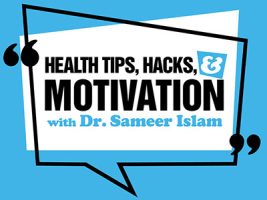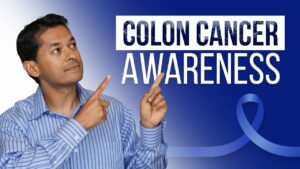This video discusses the importance of gut health and the role a balanced diet and other lifestyle measures, such as mindfulness and exercise, play in maintaining a healthy gut microbiome. The connection between the brain and gut is explained and options for improving one’s internal fitness are provided. Three dietary-sourced molecules (tryptophan, serotonin, and melatonin) are highlighted and advice is offered to help readers achieve a well-balanced microbiome.
VIDEO HIGHLIGHTS
- Gut health is important due to its connection with long-term health, energy, illness, mental clarity and emotional wellbeing.
- Three molecules that must be obtained through diet are tryptophan, tyrosine, and 3-lactic acid.
- Poor diets can damage the composition of the gut microbiome and make it difficult to obtain healthy bacteria.
- Stress can also have a negative impact on gut health.
- It is possible to improve the gut by changing one’s diet, managing stress levels, exercising regularly and taking targeted supplements.
FULL TRANSCRIPT
Welcome everyone. Today is Ted Talk Tuesday. Now, I’m really excited to talk about today’s TED Talk, where I’m going to do a reaction video to a topic. I know a lot about the gut microbiome. Ah, yes. My specialty, my my expertise. I’m going to dig into it and give you my reaction to this really popular Ted Talk on the gut microbiome.
Love the title, your microbiome, your Most Important Organ. You’ve never heard about it. Yes, the microbiome is such a special and a new place they’re learning a lot more information on, and I’m excited to learn more about the microbiome, maybe things I don’t even know about as well. Let’s dive in. Brief. Hello. I’m a 38 year old entrepreneur, biochemist, went to m I t Be School of Medicine, and I’ve decided to dedicate my life. All right, that’s, that’s some pretty impressive resume there, man. I, I wish that I, yeah, that’s, that’s impressive right there. I’ve been really fortunate over the last few years to have worked with professional athletes and professional athletic teams to try to improve their gut health because it’s so intimately related to things like increasing performance, decreasing sickness, and improving recovery time. See, that’s interesting because we are getting a lot more information now about how the gut microbiome can actually affect things outside the GI tract, whether it’s Parkinson’s, Alzheimer’s, neurological diseases, acne or hair or things like that. Now, one thing I do have to specify is that we don’t have clear evidence yet that this actually plays a role in things outside the gut.
So I know this was made in 2019, it’s 2022 now, we don’t have clear evidence yet. I’m hoping we’ll get there soon. But I wanna specify that and make sure you’re clear on That. I’m here to talk to you about what I think is the most important organ, and that is the gut microbiome. So for those of you who don’t know what the gut microbiome is, it’s everything from your mouth to your colon, from entry to exit, all the bits in between. So your stomach, your small intestine, your large intestine, and all of the little critters that live in there. So, bacteria, fungi, viruses, and cells. There are trillions of these little critters that are living in there, and we’ll talk about this a little bit more later, but diversity is so important in The gut. That’s key. And if, if anything you can get from this head talk is diversity is the key. That is the most important thing to predict a excellent or great gut microbiome. It is the most important thing that you can have for your gut microbiome. Diversity of bacteria, diversity of fungi, diversity of of viruses.
This is the key thing when it comes to the gut microbiome. And I hope she delves into what we can do to make it diverse. Cause I’ll tell you, if she does it, I’ll tell you my tips. So why is it important to have a healthy gut? Well, it’s really important for long-term health. So if you have a healthy gut, you’re gonna feel more energetic. You’re gonna get sick less often, you’re gonna have better mental clarity and ultimately have better emotional wellbeing. I’m gonna have to stop here once again, and I’ll be honest with you, we just don’t have excellent evidence that that plays a role so far when it comes to how you’re feeling, I believe in it, and I do feel this manifestation in a lot of my patients, but to, to have a statement that it actually does do that. Right now, we don’t have any clear evidence for that. A lot of research is showing that this is related to things like autoimmune conditions, diabetes, neurodegenerative disorders, like Alzheimer’s, and even emotional issues like anxiety and depression. So our theme for today is, you are what you Eat.
Yes. I love that. I love that. I love that. I love that you are what you eat. Absolutely. 100% you are what you eat. And I hope what you are is a plant-based eater. Little, little preview there. Eating poorly can do really two things. So the first one, it can prevent you from getting the nutrients that you need to stay healthy.
And second, it can actually damage and change the entire composition of your gut. So true. So true. So true. A hundred percent agree with her. This is exactly right. And it does play a role in terms of your health. Absolutely. So today we’re gonna look at three molecules that you get from dietary intake. You have to eat these things.
So the first is something called tryptophan. You probably heard of this Tryptophan. Ah, yes. Having that Turkey, making you sleepy. Luckily I have a video on this. You can click up here. So your body takes tryptophan and converts it into a lot of other really important molecules, two of which we’re gonna talk about today. So one called serotonin.
Yeah, serotonin is something that makes you happy, super important, and something called melatonin, which actually helps you to sleep. So imagine if you don’t have any tryptophan or you’re not consuming enough trip tofa. Well, no matter how many roses or diamonds or, or chocolates your significant other brings you, it’s just not gonna make you happy. And that’s kind of sad.
Also, you won’t be able to sleep, so you won’t be able to count sheep at night. Another example, it’s a compound called tyrosine. So tyrosine, another amino acid is found in foods like almonds, but it’s also founded lentils and seeds and edamame, tyrosine is converted to a variety of really important things as well. So we’ll talk about dopamine.
Dopamine is a compound that you may have heard of, and it’s essentially, it motivates you to do stuff. So it’s this initiative oriented behavior that it helps to propel and epinephrine, which is also known as adrenaline, the fight or flight molecule, which is really helpful when you’re up on this stage. So, you know, imagine if you don’t have these things, what would happen? Well, here’s what would happen. One, you’d be drooling on your couch. Or worse yet, if you were being chased by, by a mountain lion, which I’m sure you know, who knows, may happen at some point in everybody’s life, the emoji being, you know, huh? You don’t want this to happen, right?
You need a body to respond to these types of situations. Third, we’re gonna talk about something called adult three lactic acids. So it’s really important, it’s found in fermented foods Like Pickles, sauerkraut, kimchi, keffer, Fermented foods. Yes. I think we’ll go into the reason why fermented foods are very important, because of the reaction it occurs inside your gut microbiome to make it better.
So let’s talk a little bit about what makes it healthy microbiome. So I’ve tried to simplify this a bit, but essentially each emoji is a type of bacteria. You have different ones, right? So you’ve got some that digest veggies, some that digest meats and breads and oils. And your gut is populated by many, many different types of things. So in a healthy gut, you have very diverse species in there. Yeah. Now, let’s say you decide that you are just going to eat foods that are really high in fat. Things like hotdogs and ice cream and, and Pizza. Sounds good, Huh? Pizza sounds really good right now, if you train your system to do this, your gut’s gonna start producing more and more of the type of bacteria that are used to seeing the kinds of foods that you eat.
And that’s exactly right. I love this because your bacterial will be trained and be responsive to what you eat. So if you eat crap, you’re going to feel like crap. So her analogy, if you’re gonna eat fat, you can produce a lot of fatty bacteria, which is not good for a healthy gut microbiome, and that’s going to predominate and lose that diversity that you’re hoping to get.
Eventually, You’re gonna skew the ratios, those bacteria are gonna out-compete. Yeah, the other types that are there because they’re just not being used. And then you’ll end up with a situation where you can have a very unhealthy, not diverse set of bacteria in your gut. Now, you might ask, can you reverse that? Yes. But it often takes a lot of time and energy to do.
Sometimes you actually can’t. Sometimes you just, you know, once those bacteria are gone, it’s really tough to bring them Back. And that can be frustrating for a lot of patients. It is. It is true. You can bring back the bacteria that you are hoping to get, but you may be really behind the eight ball. It may take time, even medical therapy, to get back to normal or even to a healthy gut marker biome. So it can happen. But for some people, it may take longer and it may take more help, some reinforcement to get you there. Here’s the sad part. Many of the things that we do in our life are in fact, completely lethal To the microbiome.
It’s true, very true. I love chips. Sadly, you don’t find a lot of healthy stuff in most chips. You’re not gonna find tyrosine, tryptophan or i l a here. Yeah, antibiotics, medicines helpful, but they kill bacteria. And they don’t just kill bad bacteria, they kill all bacteria. And that’s really, really important. You know, one of the things that we try to do as physicians is to not give you antibiotics if it’s not necessary. And sometimes we get into this habit every time you’re sick, ah, popping antibiotic, I’m gonna feel better. But here’s what’s gonna happen. Exactly right? Your whole gut microbiome is going to be wiped out. Not only do you not have the bad guys, you also don’t have the good guys that acts as an atomic bomb in your gut market biome to wipe everything out and cause really bad damage inside your gut. And this is one of the reasons why you can develop a condition called C difficile or c diff diarrhea. This is when you have all of your B, all of your bacteria wiped out from antibiotics, and then you have a proliferation of bad bacteria called C diff that cause really bad diarrhea and actually can cause death in certain individuals. You know, you hear this, stress kills, kills things. Stress is bad. We could have a whole 30 minute talk on the impact of stress on the microbiome. Stress is in fact, extremely bad for the microbiome.
Your central nervous system, your brain is intimately connected to your gut. The two talk, It is a, that’s exactly right. It’s called the brain gut axis. It’s a superhighway between here and here and here and here. And often for my patients who are stressed, what effects here will totally affect your gut and your gut microbiome, and vice versa as well.
And this is why sometimes the treatment that we give, it’s not gut related, it’s mind related. And so we use that to give you the total care to get you feeling better. Now, it may seem strange to see a GI doctor, and you’re having gut issues. When we talk about your mind, this is why. So what can we do about this?
All right, here we go. Well, the good news is not all is lost. It is possible to improve your gut. And this is one of the things that I get to do every day. And I’m so fortunate in my job, my company actually is trying to measure the functional state of the gut, define what that is, and then to create interventions to improve it.
We call this improving your internal fitness. Hmm, I like that. So What are some simple things that you can do to help improve your gut? Well, one, we’ve talked about changing your diet. Two, we’ve talked about stress management techniques, incorporating mindfulness, meditation, breathing exercises to minimize your stress or exercises. Great. 15, 20 minutes of walking a day can help to, you know, keep you regular. It can, you know, we talk about that in front of the group, but that’s what we do. It can help to, you know, mitigate your stress and it can actually help to promote the growth of certain types of bacteria. And then lastly, targeted supplementation. I’m not saying to take lots of different supplements.
I’m saying if there’s certain things that your body needs, you might actually take a supplement. I, I like that term targeted supplementation, because I always tell my patients, you cannot supplement yourself to health. If you’re eating bad, you’re not working out, you’re not exercising, you’re slashing on the couch, you’re drinking alcohol and smoking. There’s not gonna be any supplement that’s going to help you out.
If you want targeted supplementation, that is the key. I like that term a lot. So the next time that you’re lying on the couch feeling lethargic and not sure why, or you’re sick for the fifth time in a year, listen to your gut. Thank you. It’s a great talk. I like this. Here’s what I want to give you my thoughts.
Number one, there are ways you can make your gut better. The number one thing by far that you can do to improve your diversity of your gut is to have a wide variety of plants. By far, by far, by far, this is the number one benefit to improve your gut microbiome. Number two, stress plays a huge role when it comes to gut health.
Find a way to minimize that, whether it’s exercise, yoga, prayer, whatever you need. Number three, make sure that you do incorporate some sort of exercise in your everyday life, even if you don’t use this as a stressful leave. And number four, I love this idea of targeted supplementation. There are certain things that we can give to help out, like things like turmeric, curcumin, other enzymes. But not everyone needs them, and not everyone should be on them. I love these tips. I like this TED talk. It gave a lot of good information. And if you’re interested in learning what you can do more for your gut microbiome, don’t forget to subscribe to my channel. We have a lot of videos, tons of videos on ways you can improve your gut microbiome. Guys, thank you for watching. See you guys in the future.



